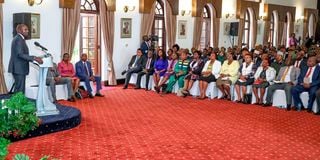On Kenya Kwanza budget, the devil is in the details

President William Ruto during the Kenya Kwanza Parliamentary Group Meeting at State House, Nairobi on May 23, 2023.
The devil, as they say, is in the details. The public debate on the Finance Bill is illustrating the need to pay attention to the fine print. Most importantly, you must pay attention not just to the proposed amendment, but what is being amended in each of the various acts.
Some amendments appear benign at first glance but have far-reaching negative effects. Let us examine three: import declaration fees, zero-rated versus exempt status, and treatment of membership organisations such as chamas, clubs and trade associations.
Clauses 67 and 69 of the Finance Bill propose to amend sections 7 and 8 of the Miscellaneous Fees and Levies Act, No. 29 of 2016, by reducing the applicable rate of import declaration fees (IDF) from 3.5 per cent to 2.5 per cent, and that of the railway development levy from 2.5 per cent to 1.5 per cent respectively. In addition, the amendments remove the provisos in both sections.
Supporters of the Bill have sought to persuade Kenyans that the proposed amendments will reduce the cost of importation, thereby supporting many small businesses that sell imported goods. They have claimed that such a move will create jobs. That may very well be so.
But the proposed reductions are also bad news for Kenyan producers because they make imported goods more price-competitive compared to Kenyan-made goods.
And keep in mind that other production costs like electricity and fuel are increasing, due to the increase in VAT on fuel from eight to 16 per cent, proposed at clause 28 of the Bill. Transportation costs are also increasing due to the higher fuel prices, as well as increases in advance tax on commercial vehicles, contained in clause 24 of the Bill.
The provisos being removed in sections 7 and 8 provided for a lower rate of 1.5 per cent IDF fees for raw materials and intermediate products imported by manufacturers and for construction materials for the affordable housing programme! Both categories of goods also paid a lower rate of the railway development levy.
The current proposals will not only make imported goods cheaper, but they are also simultaneously making domestically manufactured goods more expensive!
The lower IDF and railway development levy for construction materials had been sold by largely the same politicians now pushing for affordable housing!
The 2016 Act that is being amended provides that 10 per cent of the IDF collected shall be paid into a special fund, which shall be used to pay for Kenya’s contributions to the African Union and any other international organisation of which Kenya is a member.
Special fund
To this a new levy and fund are proposed – the export and investment promotion levy. Proceeds will also be paid into a special fund which, the Bill says, “shall be to boost manufacturing, increase exports, create jobs, save on foreign exchange and promote investments.”
This amendment appears hastily put together, perhaps the result of last-minute lobbying. Obviously, importation cannot save foreign exchange. The list of goods which will attract the levy is also illustrative — clinker, iron bars, kraft paper, sacks and bags. This amendment also contradicts the IDF one immediately before it, as the former makes local manufacturing more expensive. The Bill is silent as to how, and who will manage this special fund.
Supporters of the Finance Bill have been bragging that they are making many goods VAT-exempt. They claim this is a good thing, which should make goods such as unga from maize, cassava and wheat, human medicines like insulin, and pest control products cheaper. This is not the case.
Either they have not read the Bill or they are being very economical with the truth. These goods are currently zero-rated; when you buy them, you do not pay VAT. In addition, the manufacturer can claim back the VAT she paid on the inputs she used to produce these goods.
But when goods are in the VAT-exempt category, you do not pay VAT on the sale and the manufacturer cannot claim the VAT on the inputs used to produce those goods. All other things being equal, goods in the zero-rated category are cheaper than goods in the VAT-exempt category!
It follows that to promote local manufacturing, it is goods made in Kenya that should be zero-rated. Where government wants to provide some relief on goods that have to be imported, then they should be in the exempt category.
Clause 17 proposes to amend section 21 of the Income Tax Act. At first glance you may think that this is simply streamlining membership clubs and trade associations, making it easier for taxation purposes, but this isn’t the case.
The old section that is being amended provided that if most of your club or chama proceeds arise from activities by the members, then you are not deemed to be carrying on a business and you are not taxed. The proposed amendment does away with this proviso, with the effect that chamas and other membership clubs are now taxable.
Trade associations, such as the Jua kali federation or the Kenya National Chamber of Commerce or Kenya Private Sector Alliance have been tax-exempt, but could elect under sub-section 2, to declare business income, if they had any. The proposed amendment deletes the sub-section removing the relief. The effect being that trade associations will now pay taxes.
@NdirituMuriithi is an economist





